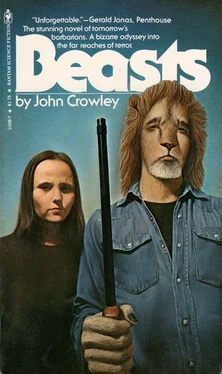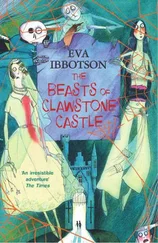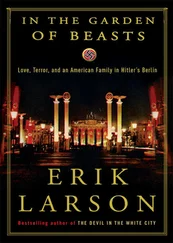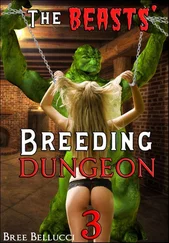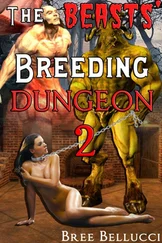Through the open door he could see, fan off, Mika and Loren coming back across the field, Mika running, teasing Lonen, who came carefully after with the collecting bottles. Their nets were like small strange banners. His only army. How much could he tell them? All, none? Would it have to be always his alone? Tears started in his eyes. No! He had to start for the house now, before they saw him, saw his horse.
He pulled up on the lawn before the white-stained perch where Hawk stood, preening himself, calm, In the growing twilight he looked huge; his great barred breast smooth and soft as a place to rest a baby’s head.
How do you bear each day? Sten thought. How do you bear not being free? Teach me. How do you be leashed? Teach me.
“Sten will stay quietly on that estate,” Reynard said to Painter. “For a time, anyway. The Union for Social Engineering is being blamed for Gregorius’s death, though naturally they will deny it strenuously. And my poor chauffeur, who probably hated USE even more than he hated Gregonius, will never get out of prison. The documents that made him a USE agent were put in his apartment by me. I gave USE good reason for murdering Gregorius: the paper I wrote for him, which of course he never saw, was a violent denunciation of USE, and contained some — rather striking — premonitions that taking this stand might cost him much. The paper will stand as the moving last words of a martyr to independence.
“The Reunification Conference won’t be held. Not this year, not next. No one will trust USE any longer: an organization capable of butchering a head of state for disagreeing with it is no arbiter of peace and unity. I don’t, however, put it past the Federal to try some other means of getting power in the Autonomy. There will be pretexts…”
Caddie listened to him with fascination, though she didn’t understand much of what he said. It seemed as though he had only a certain store of voice, and that it ran out as he spoke, dwindling to a thin whisper; still he went on, talking about betrayals and murders he had committed without emotion, saying terrible ironies without a shade of irony in his voice. Painter listened intently, without comment. When Reynard had finished, he said only:
“What good has it done me?”
“Patience, dear beast,” Reynard whispered, leaning his delicate head near Painter’s massive one, “Your time is not yet.”
Painter stood, looking down at the fox. Caddie wondered how many men had ever seen them together so. Herself only? The oddness of it was so great as to be unfeelable. “Where will you go now?” Painter asked.
“I’ll hide,” Reynard said. “Somewhere. There’s a limit to how far they can pursue me here, in this dependency. And you?”
“I’ll go south,” Painter said. “My family. It’s getting late.”
“Ah.” Reynard looked from Painter to Caddie and back again. “Just south of the border is the Genesis Preserve,” he said. “Good hunting. No one can harm you there. Take that route.” He looked at Caddie. “You?” he said.
“South,” she said. “South too.”
4
GO TO THE ANT, THOU SLUGGARD; CONSIDER HER WAYS, AND BE WISE
If they had lived on one of the lowest levels, the sun would already be setting for them; and down on the ground, only a few empurpled clouds would have been seen in a sky of lapidary clarity — if there had been anyone down on the ground to see them, and there wasn’t, not for nearly a thousand square miles, which was the extent of Genesis Preserve. But up where they lived, above the hundredth level, they could still see the sun flaming crimson, and it wouldn’t disappear from the highest terraces for minutes more. There was no other time when Meric Landseer felt so intensely the immense size of Candy’s Mountain as when he looked down at evening into the twilight that extended over the plains, and watched it crawl level by level up toward him.
Sunlight pierced the glass he held, starting a flame in its center.
“‘You are the salt of the earth,’” Bree read, “‘and if the salt has lost its savor, wherewith shall it be salted?’ What does that mean?”
“I don’t know.”
Bree sat upright on the chaise, her tawny legs wide apart, knees glossy with sun, with their extra share of sun. She scratched herself lazily, abstractly, turning the fine gold-edged pages. She was naked except for brown sunglasses and the thick gray socks she wore because, she said, her feet got cold first. The sun, striking lengthwise through the utter clarity of this air, drew her with great exactitude: each brown hair on her brown limbs was etched, every mole had highlight and shadow; even the serrations of her full, cloven lips were distinguished from the false wetness of the gloss that covered them.
Meric loved Bree, and she loved him, though perhaps she loved Jesus more. The sun made no distinctions, and in fact rendered the raw concrete of the terrace’s edge as lovingly as it did the amber of Meric’s drink or Bree’s limbs. Jesus was unlightabbe; he made a darkness, Meric felt, fluorescing from the little book.
Shadow had climbed to their level. Bree put down the book. “Can you see them?” she asked.
“No.” He looked out over the rolling grassland, fallow this year, that went on until evening swallowed it. Perhaps, if he had the eyes of the eagles who lived amid the clifflike roofs above, he could: he had watched the eagles, at his own terrace’s height, floating on the complex currents, waiting for the movements of hares that dashed like fish through the sea of grass below. “No, I can’t see them.” Impossible for someone who lived here to fear heights, and Meric didn’t; yet sometimes when he looked down a thousand feet he felt — what? wonder? astonishment? — some sudden emotion that waved him like a banner.
“It’s cold,” Bree said, almost petulant. A brief Indian summer had flamed and was going out again. Bree had taken it as a right, not a gift; she always felt wronged by the sun’s departure. She stood, pulling a long robe of Blue around herself. Meric could look far down along the terraces that edged their bevel and see others, men and women, rising and drawing robes of Blue around themselves,
The sudden evening drop in temperature raised winds. The Mountain was designed not to intrude in any way upon the earth, to do no damage, none, to her body and the membrane of life stretched across it. Utterly self-contained, it replaced what it used of Earth’s body exactly. borrowing and returning water and food by a nice reckoning. And yet the air was troubled by its mass; stuck up into the sea of air like an immense stirring-rod, it could raise and distort winds wildly. Once a year or so a vast pane of amber-tinted glass, faultily made, was sucked by wind from its place and went sailing out over the Preserve for hundreds of yards before it landed. When that happened, they went out and found it, every splinter, and brought it back, and melted it, and used it again.
But they couldn’t cease troubling the air. A building a half mile broad and nearly as high, set amid rolling hills of grass, will do that; and it was not only Meric who felt bad about that, and as it were begged Wind’s pardon.
“They’re there, though, aren’t they,” Bree said. She closed the terrace doors behind hen, but a wind had gotten in and went racing around the level, lifting rugs and drapes of Blue and making the wall panels vibrate.
“They’re there somewhere.”
She turned up the tapers at the low table and nudged the pillows close to it with her gray-socked feet. Beyond their doorless space, far off perhaps — the drafts and airs made it hard to judge — men and women began an antique hymn as they returned from work; Meric and Bree could hear the tune but not the words.
Читать дальше
